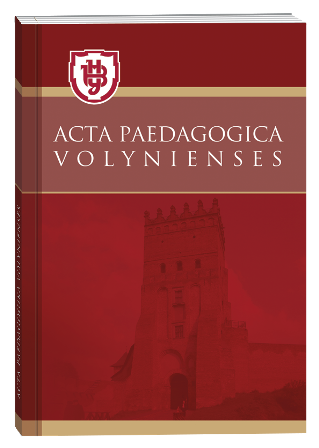THE FORMATION OF HUMANE RELATIONS AS A COMPONENT OF THE LEGAL SOCIALIZATION OF CHILDREN
DOI:
https://doi.org/10.32782/apv/2023.4.2Keywords:
legal socialization, humanism, education, humane relations, humane relationships’ formationAbstract
The preschool child development program "Ukrainian Preschool Education" sets before us the task of developing children’s ability to live together with others, that is, the problem of early socialization of the child. An indicator of fullfledged social development of a preschooler is his awareness of his rights and responsibilities. In the work, the goal of the research was achieved, which consisted in the identification, theoretical substantiation and experimental verification of the pedagogical conditions for the formation of humane relationships of seven year old children. The research used theoretical schematization and dialectics, i.e. the relationship, mutual influence and interaction of legal socialization and the formation of humane relations, considered in different projections. From the point of view of the individual’s place in each of the processes: in the course of legal socialization, a person is a subject, since the acquisition of social qualities for a person is primarily a vital condition for his existence. In the process of forming humane relations, a person rather acts as an object of influence from society. Society is interested in citizens having a certain level of legal culture, a system of legal knowledge, abilities and skills, legal thinking, and legal feelings. So, society is an active agent of legal education, and an individual is the object of the legal educational process. At the same time, the article reveals that in reality the dialectic of legal socialization and the formation of humane relations is much more complicated, because the formation of humane relations in the course of socialization plays not only a passive role, the active position of the subject in the process of education is also of great importance. Considering the relationship between legal socialization and the formation of humane relations from the point of view of the nature of the process, for the most part, the process of forming humane relations has a purposeful nature, since by its definition it is an organized, systematic, purposeful and controlled influence on a person with the aim of forming desired social qualities. Social qualities, which have already been acquired thanks to the system of forming humane relations, are a kind of filter that passes the impulses of the social environment. This, in our opinion, determines the leading character of the formation of humane relations in legal socialization. The essence of the concept is revealed: humane relations, socialization; the meaning of the terms relations, humanism, humanity, humaneness of the individual has been clarified. The concept of "humane relations" is considered in the study as such relations that recognize the interests and needs of another person, provide constant focus on the person, compassion and empathy, timely and selfless help, care, sensitivity, mercy and kindness. The level of formation of humane relationships of children is substantiated according to the following indicators: gnostic – knowledge of the rules etiquette in communication, the ability to evaluate communication situations and behavior of its participants, to warn and resolve conflict situations, understanding verbal and non-verbal means of communication; behavioral – skill establish contact, clearly express your thoughts, initiate and maintain a conversation, show understanding and respond to the behavior of partners on communication, sociability; motivational – interest in the process and communication partners, the desire to humanize the communication process, balance of motivation for others and for oneself, breadth of motivation; emotional – satisfaction with communication, taking into account the emotional state communication participants, the culture of expressing feelings in communication, control emotions during communication, the ability to sympathize and empathize. Based on the indicators of the development of humane behavior, its levels are determined formation in seven year old children. The structure of upbringing and pedagogical conditions of humane relationships of children formation are substantiated and experimentally tested their efficiency. To objectively identify the levels of upbringing in children of humane relations, three interrelated components are highlighted: cognitive-cognitive, emotional-value and motivational-behavioral. Pedagogical conditions have been established that contribute to the formation of humane relationships of children: formation of a complex of knowledge, skills and skills of humane relations: purposeful and constructive interaction teachers and families with the aim of creating a humane and tolerant educational system environment; application of specially selected pedagogical methods real detection by older preschoolers of humane qualities, humane feelings and humane actions.
References
Арцишевський Р. А. Духовне осягнення дійсності : монографія. Луцьк : ПФ Смарагд, 2011. 272 с.
Базовий компонент дошкільної освіти в Україні / затв. наказом МОН України № 33 від 12.01.2021. URL: https://mon.gov.ua/storage/app /media/rizne/ 2021/12.01/Pro_novu_redaktsiyu%20Bazovoho%20komponenta%20doshkilnoyi%20osvity.pdf
Бex I. Mopaльнa пeдaгoгiкa : пpaвилa мaйcтepнocтi. Дoшкiльнe виxoвaння. 2010. № 3. C. 2–8.
Білан О. І. Програма розвитку дитини дошкільного віку. «Українське дошкілля». Тернопіль : «Мандрівець», 2013. 264 с.
Бужина І. В. Гуманні відносини молодших школярів, сутність, досвід, закономірності. Одеса : Маяк, 2001. 367 c.
Діти і соціум : особливості соціалізації дітей дошкільного та молодшого шкільного віку : монографія / А. М. Богуш, Л. О. Варяниця, Н. В. Гавриш [та ін.] ; за заг. ред. Н. В. Гавриш. Луганськ: Альма-матер, 2006. 368 с.
Дудкевич Т. В. Дошкільна психологія : навчальний посібник. Київ : Центр учбової літератури, 2007. 386 c.
Освітній напрям «Дитина в соціумі» : витяг з базового компонента дошкільної освіти (нова редакція). Дошкільне виховання. 2021. № 4. С. 9–10.
Скрипник Н. І. Психолого-педагогічні засади виховання гуманних взаємостосунків у дітей старшого дошкільного віку : монографія. Умань : Видавничо-поліграфічний центр «Візаві», 2012. 153 с.
Соціалізація дітей старшого дошкільного віку в умовах ДНЗ : монографія / Н. Гавриш, О. Рейпольська та ін.; за заг.ред. О. Рейпольської. Київ – Кропивницький : Імекс-ЛТД, 2018. 280 с.







